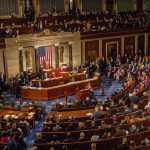The Chief Executive Officer of Ecobank Transnational Inc., Jeremy Awori, has called on African countries to improve trade among themselves to reduce the impact of United States President Donald Trump’s new trade tariffs.
Awori gave this advice during an interview with Bloomberg TV while reacting to Trump’s decision to replace the African Growth and Opportunity Act with new tariffs. For years, about 30 African countries used AGOA to grow their export markets, especially for textiles and other goods.
According to Awori, even though the U.S. is not Africa’s largest trading partner, these new tariffs could still affect African economies—especially if key buyers like China also cut down on African exports.
“The new U.S. tariffs show why African countries must move faster in fully putting the African Continental Free Trade Area (AfCFTA) to work,” Awori said.
The tariffs will now range from 10% for countries like Benin, Kenya, and Cape Verde, to as high as 50% for Lesotho, which is currently the highest rate given to any sovereign nation.
Awori added that the AfCFTA is not just about reducing tariffs but also about solving problems like strict visa rules and transport challenges that especially affect landlocked countries.
He also warned that Trump’s earlier move to stop aid to African nations—along with these new trade rules—could push six million more people into extreme poverty. This, he said, is based on Ecobank’s research.
Meanwhile, Nigeria’s Federal Government responded on Sunday, warning that the new U.S. trade policy will likely affect the country’s non-oil exports. Though oil remains Nigeria’s main export to the U.S., many non-oil products that were previously free under AGOA may now face up to 10% tariffs.
“This may make Nigerian goods less competitive in the U.S. market,” the government said.
Despite efforts to boost trade within the continent, intra-African trade only rose by 3.2% in 2023 to reach $192 billion. This still makes up just 15% of Africa’s total trade, far below other regions.
Awori urged African governments to focus on trading more with each other and adding value to raw materials locally.
“Now more than ever, African countries must focus on trading more with each other and creating a seamless framework for intra-continental commerce,” he said.











